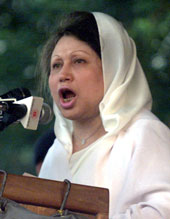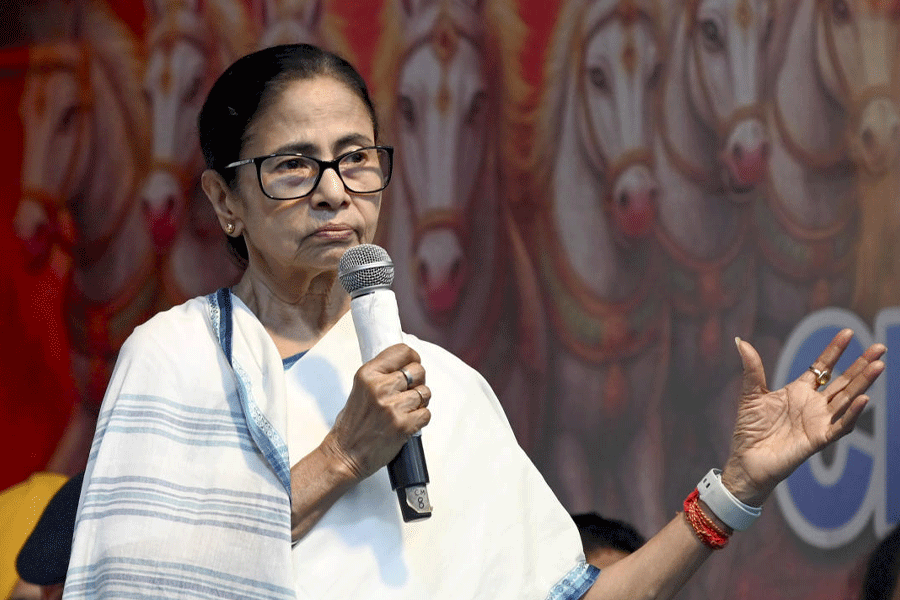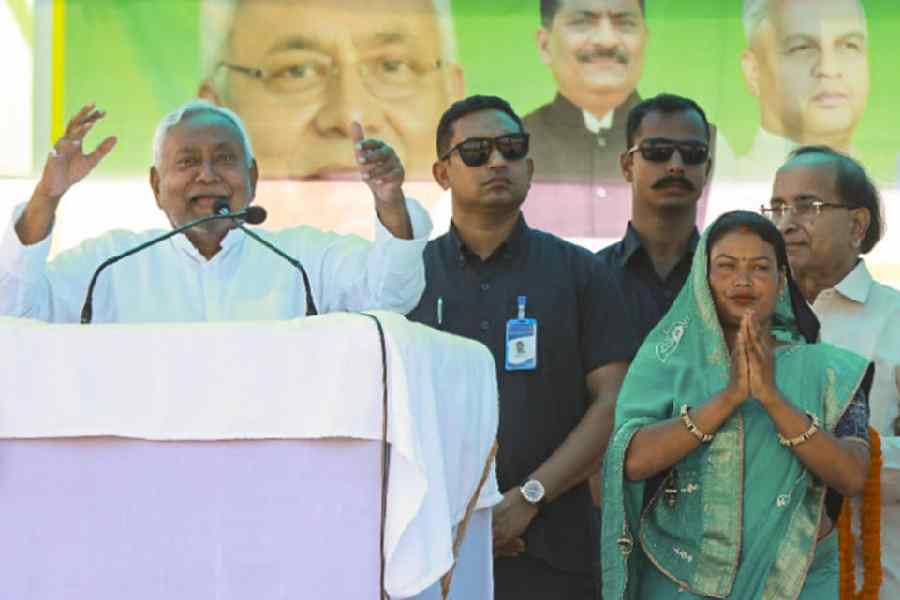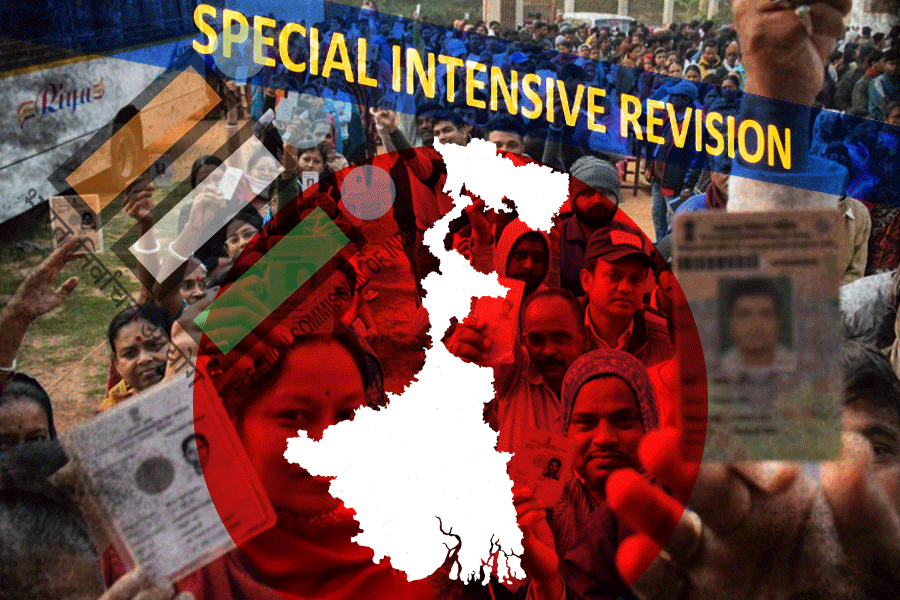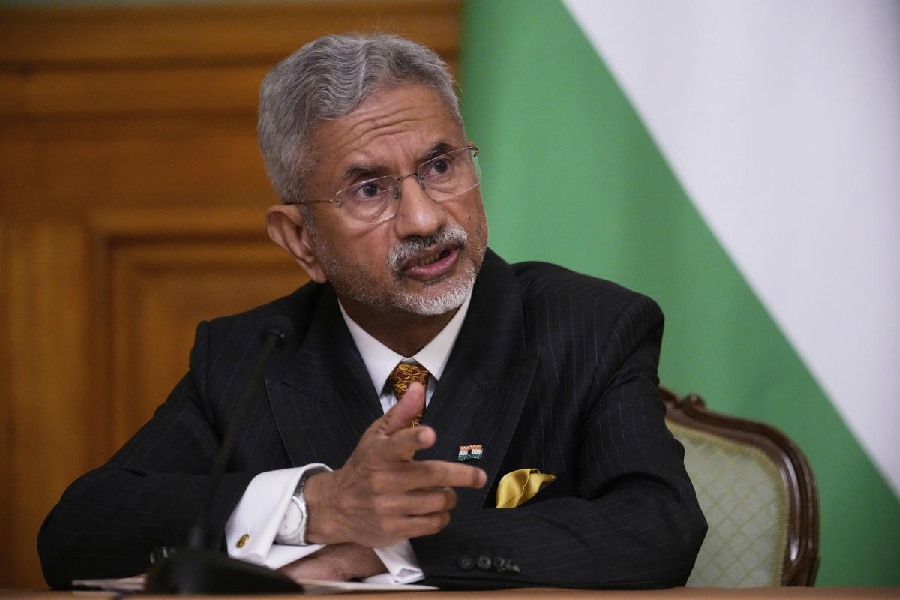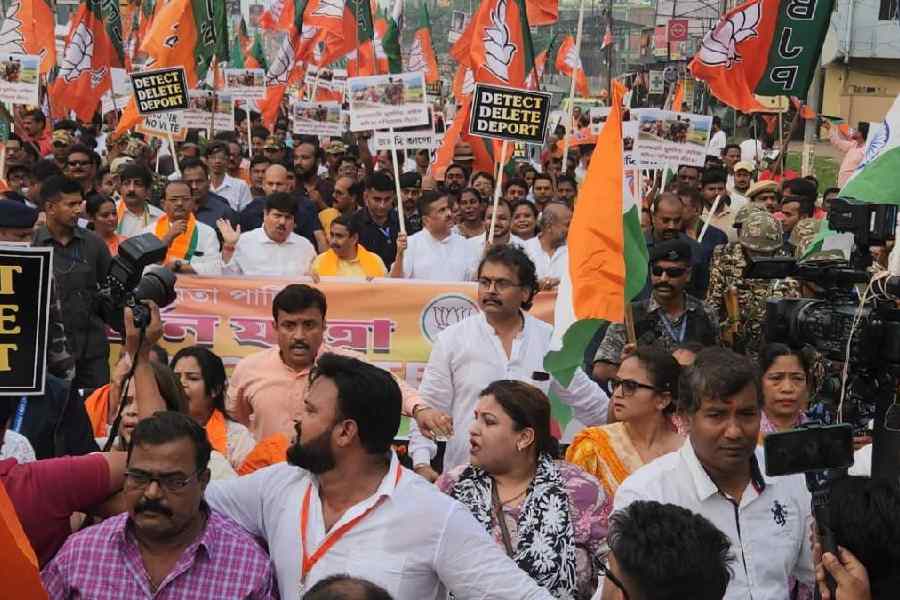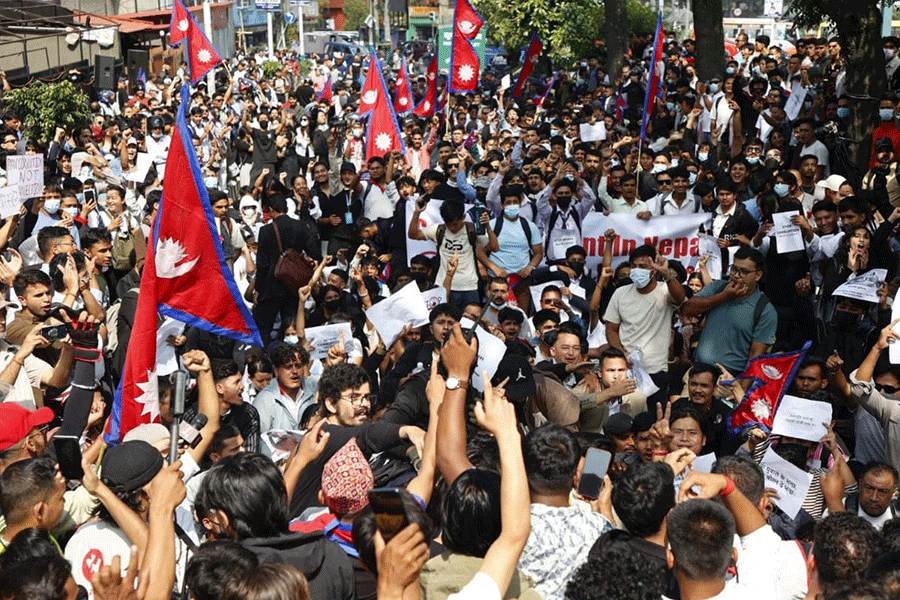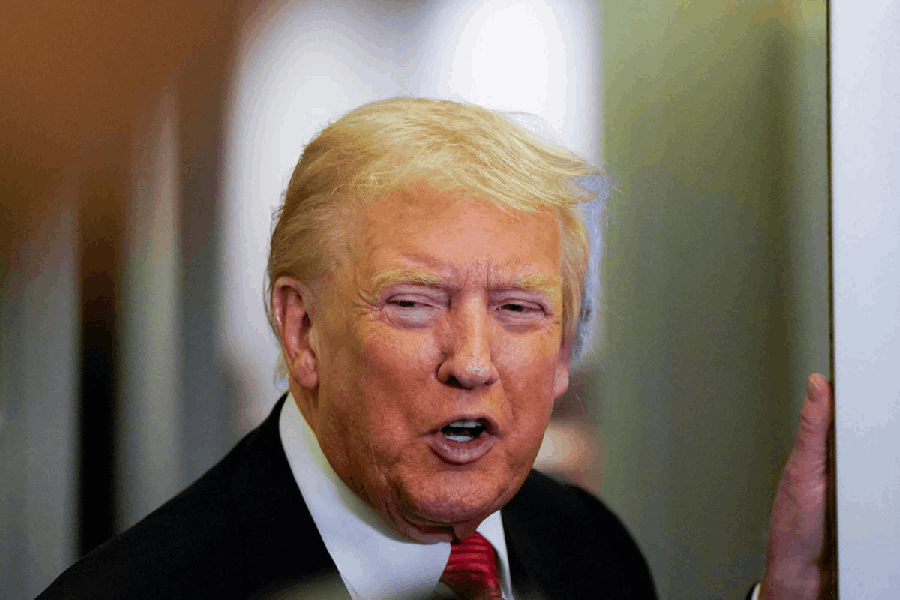 |
| TERROR CLOUDS: (Clockwise from above) An Awami League activist reacts after the August 21 blasts; Sheikh Hasina speaks at her residence the day after; Bangladesh Prime Minister Khaleda Zia. (PTI/AFP/Reuters) |
Abdul Mannan’s story is familiar to those who visit Sheikh Hasina’s home in Dhaka’s posh Dhanmondi area. When he was a boy of five or six, he was one day picked up by Hasina from a neighbouring street. She brought him up, got him a job on her personal staff and arranged his marriage. When Abdul, now a young man of 24, became a father recently, Hasina went about telling people she had become a “dadi”.
On August 21, the world nearly came to an end for Abdul and for his “Ma”. Grenades, bombs and bullets turned Bangabandhu Avenue in central Dhaka into a killing field. Hasina and other leaders of her party, the Bangladesh Awami League (AL), were the targets of the worst-ever assassination attempt in Bangladesh since August 15, 1975, when her father, “Bangabandhu” Sheikh Mujibur Rahman and 16 others of his family were killed in his house in an army coup.
For nearly an hour after the attack took place, Abdul did not know if “Ma” was alive. He rushed to hospitals, carrying the injured, his clothes soaked in their blood. “I couldn’t think of anything. My mind went blank. I thought Ma was dead,” he recalls. Only when he reached Sudha Sadan, Hasina’s home, did he know she was alive. “Only then did I have time to break down.”
It was much the same experience for Nakibuddin Ahmad, Hasina’s relative and once her deputy press secretary. “When I fell at her feet here, crying uncontrollably, she said, ‘Why are you crying? Can’t you see I’m alive and safe?’” he remembers, sitting in the drawing room of Sudha Sadan.
Not every one present at that AL rally was alive and safe, though. Nineteen people had been killed on the spot, including one of Hasina’s personal bodyguards, and at least 500 others grievously injured. Two days later, Ivy Rahman, leading lady of the country’s women’s movement and wife of Jillur Rahman, one of the seniormost AL leaders, succumbed to her grenade injuries.
“They (the killers) wanted to create another August 15,” Hasina tells me. She, however, holds the government of Begum Khaleda Zia responsible for the grisly incident. “They have lost all sense. They think they can carry on in power if they can eliminate me. But it isn’t 1975 any more.”
Hasina may have survived yet another assassination attempt — the seventh since she returned home from exile in 1981. But more and more people feel that their country and its fledgling democracy are becoming increasingly unsafe. On the streets and in their homes, more and more people are feeling increasingly threatened.
It is not just a matter of a spiralling crime wave. Bangladesh is in the grip of a new “bomb culture” that threatens to tear apart its new democratic fabric. And there is a pattern in the bomb attacks. These are targeted at political parties, cultural groups and individuals that are associated with democracy, secularism and progressive culture. The attackers, on the other hand, are associated with 20-odd Islamic fundamentalist groups, most of them relatively unknown.
Over the past five years, they have targeted Hasina and her AL, the leftist parties like the Communist Party of Bangladesh and the Bangladesh Workers’ Party, cultural groups such as the Udichi, writers like Shamsur Rahman and Humayun Azad (who recently died in Germany under mysterious circumstances), journalists and minorities — Hindu, Christian and even the Ahmadiya sect — and cinema halls. In no case were the attackers identified, let alone arrested.
That is at the heart of the terror that has struck the nation. The common people have no idea who these assassins are. The government too has little clue. Worse, Hasina and other victims of this terror accuse the government of Zia of being hand-in-glove with many of the fundamentalist groups. “How can the government get the culprits? It’s they who are doing all this,” she says.
That is why she has no faith in the inquiry that the government has ordered into the grenade attack on the AL rally on August 21. She wants an international inquiry. And she wants the government to step down. She is not alone in losing faith in the government.
A debate is currently raging in Dhaka’s intellectual circles over whether Bangladesh has become or is becoming a “failed state”. Some suspect that there is a conspiracy to reduce it to a failed state so that an army-backed regime can take over. “I’m usually an optimist. But I now find it difficult to stick to my optimism in this atmosphere of gathering darkness,” the country’s leading poet Shamsur Rahman, who had survived assassination attempts and threats, said in the aftermath of the attack on the AL rally.
Leaders of the ruling parties such as Zia’s Bangladesh Nationalist Party (BNP) and the Jamat-e-Islami have been struck almost defenceless by the August 21 catastrophe. On earlier occasions of bomb explosions, they tried to blame the AL. But the latest assassination attempt on Hasina has left them no scope to play the old game. “Those who have done it are enemies of the country who are out to destabilise it,” senior BNP leader Abdul Mannan Bhuina has said.
But they resent the charge that Bangladesh is becoming a failed state under their rule. “How can a country be a failed state?” snaps Haris Choudhury, political secretary to Prime Minister Zia. He also tells me that the “bomb culture” began during the previous regime of the AL. “Democracy is very much on a sound footing.” As for the fundamentalist threat, he points out that it is a global problem. “You in India had a pogrom by Hindu fundamentalists in Gujarat. But our government has moved successfully against the religious fundamentalists.” In his opinion, the charge of growing religious fundamentalism in Bangladesh is “pure propaganda”.
Not only anti-fundamentalist parties and groups in Dhaka, but also most of the international diplomatic community there are not convinced by Choudhury’s argument. Among the most bitter critics of the government’s failure to check the fundamentalist fanatics are the US ambassador Harry K. Thomas and envoys of the European Union. Thomas has publicly taken the government to task on this score several times before and after the attack on the AL rally.
But there is a feeling in a section of the political class that even the AL has failed in its duty to squarely face the fundamentalist challenge. “In its anxiety not to hurt the people’s religious sentiments and, more importantly, in its anxiety not to lose its votebank, the League has shrugged away from secularism,” complains Manzurul Ahsan Khan, president of the Communist Party of Bangladesh. Even after the August 21 incident, the AL’s main agenda is “not to seriously fight the communalists and religious fundamentalists, but to topple the government”.
Rashed Khan Menon, president of the Bangladesh Workers’ Party, reiterates the charge against the AL. “Even in the Pakistani regime, I haven’t seen so many members of Parliament wearing skull caps inside the House as I see now. And there is no denying the fact that more such people sit in the opposition benches than in the treasury benches.” He is, however, hopeful that the August 21 incident has shaken the AL and the common people off the compromising attitude to the issue of secularism.
Many in Bangladesh may, however, find it difficult to share Menon’s optimism. It is true that the fight for secularist and democratic ideals took centrestage in the waves of protests and processions that hit the Kendriya Shahid Minar in the Dhaka University campus and elsewhere in the country. Numerous small cultural groups came out on the streets to try and “revive the secularist ideals of the liberation war of 1971,” as Mamun-ur Rashid of the Bangladesh Group Theatre Federation said at a gathering at the Kendriya Shahid Minar. “Shall we allow the grenades and bombs to prove more powerful than the history of our freedom movement, than the martyrdom of 20 lakh Bengalis?” he asks.
The political parties, however, have their own agenda. The aftermath of the August 21 tragedy has seen the anti-government parties trying to put their act together. Obviously, the AL is at the centre of this new political realignment. But the AL is moving fast to forge a new unity with the 11-party leftist alliance and other groups.
The veteran politician and chairman of Gana Forum, Dr Kamal Hossain, whose clean image and credibility make him acceptable to a wide cross-section of the people, is playing an important role in this new attempt to rally all anti-government forces together. “What we could not achieve in two years we have now been able to achieve because of this incident,” says Menon of the Workers’ Party.
The ruling coalition too is bracing to defend itself against a concerted political assault that could be similar to the mass upsurges against H.M. Ershad’s military rule in 1990 and against the fake election under Zia’s earlier regime in February, 1996.
These, therefore, are uncertain times in Bangladesh. A worried international community is trying to force a rapprochement between Hasina and Zia. The Prime Minister too is again talking of a “national concensus”.
It is unlikely, though, that Hasina would submit to these attempts. She would not like to lose the political advantage she now has. “Besides, how can I betray the memory of those killed in the grenade attack by sitting in discussion with this government?” she argues.
Bangladesh thus is set for another political battle between its leading ladies who have had no love lost for each other. But for the majority of the people, the country can no longer afford to ignore the real battle for democracy.

